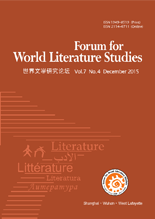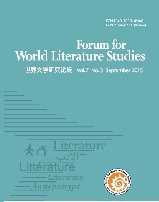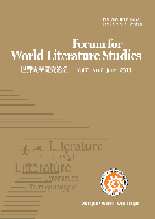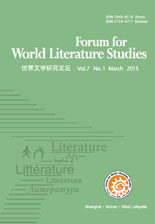Ethical Power from “the Human Heart by Which We Live”
Sui Gang
School of English Language, Literature and Culture, Beijing International Studies
University, No.1, Dingfuzhuang (S), Chaoyang District, Beijing 100024, China
Confucius Institute, School of Journalism, Language and Communication
University of Central Lancashire, Preston, PR1 2HE, UK
Email: [email protected]
Abstract In a way, this article is a brief thematic summarization of the recently- held Sino-British Conference on ethical literary criticism一“Ethical Power in Chinese and English Romantic Poetry”一characterized by stimulating dialogical approaches. It also serves as an introduction to Project P-O-E-T-R-Y as conducted at the Confucius Institute of the University of Central Lancashire (UCLan CI) in the UK, and showcases one of the Project's significant outcomes一Julie Callan's forthcoming book of poetry, which is titled I Could be Chinese, and imbued with intercultural implications. Furthermore, this article attempts to verbalize the very source of ethical power一“the human heart by which we live" (in William Wordsworth's words), and to emphasize its functions to reconnect, to recollect, to revive, to recreate, and to reshape.
Key words ethical literary criticism; ethical power; dialogical approaches; Project P-O-E-T-R-Y; intercultural implications
Author Sui Gang (Ph.D. in literature) is professor of English at Beijing International Studies University in China, and currently works as Chinese Director of the Confucius Institute at the University of Central Lancashire in the UK. His teaching and research interests focus on English Romanticism, American Transcendentalism, creative writing, bilingual creativity, and intercultural communication. His articles appear in journals such as Foreign Literature Studies, and English Today (Cambridge University Press), and his book-length publications include American Renaissance: Revelations and Influences (2014), On the Ambiguity of Imagery and the Mutability of Self (2011), and Poetry and Fiction Writing in English: A Guidebook (2003).
In 1807, William Wordsworth published his monumental poem "Ode: Intimations of Immortality", which ends with the following celebratory lines一“Thanks to the human heart by which we live,/Thanks to its tenderness, its joys, and fears,/To me the meanest flower that blows can give/Thoughts that do often lie too deep for tears" (Wordsworth 274). More than 200 years later, in 2015, the Wordsworthian commendation of the human heart was echoed and reaffirmed enthusiastically by a group of Chinese and British literary scholars and poets gathering in his home country一eventually at his home village一to discuss the unique value of literature as a mode of ethical enquiry, or "as a distinctive mode of thought about being human" (Haines 21), to reconsider the inextricable link between the age- old metaphor of the human heart and the contemporary jargon of "deep culture" as "human sameness beneath difference" (Pieterse 85), and to explore in Chinese and British literature how the ethical power as generated from the human heart would work effectively to reconnect multiple cultures, recollect primordial images, revive poetic traditions, recreate worthy literary critiques, and reshape today's intercultural trends.
1. Ethical Power as Manifested in Intercultural Communication
On the 220d and 23`d July 2015, a Sino-British Conference on Ethical Literary Criticism一“Ethical Power in Chinese and English Romantic Poetry”一was jointly held in Preston and Grasmere, UK, by the Editorial Department for Foreign Literature Studies of Central China Normal University (CCNU, China), and the Confucius Institute of the University of Central Lancashire (UCLan CI, UK). Leading the Chinese delegation was Professor Nie Zhenzhao, Founding Director of the International Centre for Ethical Literary Criticism (CCNU), and Editor-in-Chief of two literary journals of international renown, Foreign Literature Studies and Forum for World Literature Studies.
Officially launched by Dr Paul Elmer, Acting Dean of the School of Journalism, Language and Communication (UCLan), and chaired by Ms Yu Feixia, British Director of UCLan CI, the Conference provided a platform for a diverse group of Sino-British scholars, editors, and poets (from UCLan, Lancaster University, York University, Edinburgh University, CCNU, Beijing International Studies University, etc.) to take dialogical approaches to the ethical implications of Chinese and British literary classics, to critically examine perspectives on ethical literary criticism in relation to such issues as social narratives, personal expressions, artistic critiques, educational purposes, and poetic creations, and to address the importance of interdisciplinary and intercultural communication within literary circles and beyond. There seemed to be a consensus among the Conference participants一“Only when diverse people come together and interact can they unify rather than separate. Unity is impossible without communication. Intercultural communication is a necessity" (Neuliep 9). As "constructive marginal people" "[recognizing] the significance of being `in between"' (Martin and Nakayama 202), through mutually beneficial scholarly dialogues, they collaborated to "develop a universal ethic that also grants the relativistic nature of cultures" (Samovar et al 357), basically agreeing that "it is the similarities among people and cultures that can serve as an ethical guide" (Samovar et al 358). In this case, as in almost all the other cases, the unifying factor once again proved to be "the human heart by which we live" (Wordsworth 274)一the very source of ethical power.
"Communication," in Claudio Baraldi's opinion, "may be intercultural either because it highlights certain cultural differences, or because it produces evidence of hybrid cultures and transcultural realities" (70). For example, human nature, metaphorically crystalized as the human heart by Wordsworth, and theoretically defined by Professor Nie as "man's moral qualities and virtues that decisively make him human" (271), is just a transcultural inner reality of this type that can be negotiated, modified, testified, reinterpreted, or even elevated in dynamic processes of personal growth, historical development, and intercultural communication. As a matter of fact, the following major principles of ethical literary criticism as established by Professor Nie represent such an understanding of human nature, and a firm belief in literature's positive influence on human nature一“The fundamental means of ethical education is literature.Ethical selection is realized through moral teaching, which is necessarily accomplished through literature. Literature provides guidance for human ethical selection" (1-2).
At the Conference in Preston, Professor Nie elaborated on the ethical power as embodied in Qu Yuan's Li Sao and Wordsworth's Prelude, and highlighted the decisiveness of ethical selection; Dr Yvonne Reddick undertook an ethical analysis of Sambo's gravesite, and championed the human capacity to pity, to love, and to endure; Professor Su Hui gave utterance to her comparative study on Chinese and British nature poetry, and presented diverse ways of dramatization of a given poet's self-concept as an ethical being; Ms Yu Feixia philosophized Chiang Yee's Wordsworthian Odyssey in A Silent Traveller in Lakeland, and drew inspiration from his ethical ordeals; Professor Luo Lianggong described the reception of Coleridge's Kubla Khan in China, and accounted for its ethical appeals; Mr Frank Pearson expounded his views on the relationship between science and poetry in representations of the underground from 1700 to 1820, and created "caverns of the mind" as metaphors of ethical significance; Associate Professor Du Juan explained the ethical structure in Byron's Don Juan, and articulated the specified features of moral naturalism; Professor Sui Gang introduced Project P一O-E-T- R-Y as conducted at UCLan CI, and commented on the ethical connotations of British students' creative writings.…Speaking about ethical literary criticism from multiple perspectives, all the Conference participants cherished a vision of "global multiculture"(Pieterse 94), and benefited from one another by sharing their agreements and disagreements in an intellectually enriching atmosphere of intercultural communication.
Besides having fruitful dialogues at the conference venue in Preston, all the Conference participants enjoyed the opportunity to go beyond the UCLan campus to the Wordsworth Museum at the world-famous poet's home village, Grasmere, and to read, sing, and perform the selected poems from the treasure-house of world literature there to honour not only Wordsworth, not only the Lake Poets, not only multiple national poetic traditions, but also contemporary international endeavours of poetic creations. Mr Jeff Cowton, Curator of the Museum, showcased the rare manuscripts by Wordsworth, his relatives and friends, and exemplified the ethical influence of poetry on ordinary people for personality creation by telling touching stories taken from real life. Respectfully and passionately, the Conference participants in turn gave reading, singing, and dancing performances of poetry in four different languages一Chinese, English, Japanese, and Russian! Some of them used Chinese parasols and fans as props while performing poetry. Julie Callan, a British poetess, even played zhong ruan (a Chinese musical instrument) onsite to dub in background music for her China-themed song-poems.…Intercultural communication was thus made poetically attractive, and artistically charming.
2. Ethical Power as Manifested in Poetic Creation
P一O一E-T-R-Y is one of the creative projects that we have undertaken at the Confucius Institute of the University of Central Lancashire (UCLan CI) since September 2012. Among other things, it features Pluralism (P), Open-mindedness (O), Exchange (E), Transcultural Awareness (T), Recurrent Themes/Images (R), and Yield-oriented Education (Y).
To be specific, within the framework of Project P-O-E-T-R-Y, we UCLan CI teachers have been teaching "Modern Chinese Literature" (including modern Chinese poetry and fiction) in English to British students, with cultural pluralism functioning as a major principle. It is our conviction that a knowledge of modern Chinese literature (in English translation) is not only a help for a deeper understanding of the modern Chinese mind, but also a help for the individual's ethical understanding of the universals and constants generated from the human heart, that it is feasible to conduct a parallel study of pre-modern/modern Chinese and Western literary texts, and integrate close reading techniques with any other literary approaches, and that it is significant to promote transcultural communication based on textual analysis and cultural pluralism to globalize and localize today's literary education at the same time. In class, therefore, we attempt to expound the dual influence upon modern Chinese literature一traditional Chinese literature and Western literature, take practical approaches to its stylistic diversity and thematic depth, and develop appropriate teaching methods according to the British students' mentalities and aptitudes on purpose to train them to be sensitive, imaginative, and creative一as interculturally competent communicators, who "generally have a profound respect for many varied points of view and are able to understand others and to communicate appropriately and effectively with people from a variety of cultures", and who "are able to project a sense of self that transcends any particular cultural group" (Lustig and Koester 167).
Apart from discussing poetry in class, we UCLan CI teachers and students have participated actively in various poetry reading and performing events at Wordsworth Museum, Grasmere, and at Harris Library, Preston, etc. For most of us, poetry reading is writing-oriented reading, or in other words, yield-oriented education, and poetry writing as creative output is by nature a sharing or exchange. At the international cultural market, we exchange words, sometimes in poetic form, just as we exchange money, in the hope that our lives as ethical beings will be further enriched and fulfilled. Practically speaking, for British students, it is recommendable to study Chinese poems in the light of English poems that have similar recurrent themes and images, cultivate their transcultural awareness, and adopt an open-minded approach to an "aesthetics of ethics" (Beshty 12) in poetic creation, readily taking the ethical responsibility "that comes with the acquisition of intercultural knowledge and insights一that this educational experience is not just transformative for the individual but should also benefit the larger society and other cultural groups in the increasingly interdependent world" (Martin and Nakayama 37).
Ms. Julie Callan, whose new book of poetry I Could Be Chinese ` is forthcoming in the second half of 2015, exemplifies such an effective approach. She had already been an accomplished poetess when she began to attend our weekly classes of modern Chinese literature in September 2013. Since then she has been characteristically active in classroom discussions and presentations. In particular, she has digested the theoretical foundations of fully acquainted with its up-to-date trend. She modern Chinese poetics, and is can apply its creditably and justifiably in her own creative writings一as well essential elements as in her academic research from textually/contextually comparative and contrastive perspectives. In Chinese literature and culture, she has found another meaning system to refer to, and another pattern of images to work with, and has ethically empowered her own poems by making them relational, inspirational, and transformational all at once.
Julie's poems are relational. In her forthcoming China-themed book of poetry I Could Be Chinese, she follows a "non-detached, responsive way of being-in-relation" (Adamson 107) to be passionately engaged in conversing with the past, the present, and the future of China, and in vivifying typically Chinese figures, settings, events, images, and motifs, which are well selected, presented, and substantiated. At the same time, however, she poetically shows the wider implications of those figures, settings, events, images, and motifs一beyond China's boundaries, and beyond the limits of any time. As a "multicultural person" "who comes to grips with a multiplicity of realities" (Martin and Nakayama 201), Julie has visited China for several times, and got in close contact with real people, routines, and objects there; more importantly, she shapes them into poetic realities, that is, expressive and suggestive images, and reveals in her imagistic poetry her personal and transpersonal relations with them through interactive intercultural experiential activities一walking the Great Wall, cruising down the Yangtze before the completion of the dam, watching lion dances, seeing a mini-opera about peacock lovers, contemplating on the terracotta warriors in Xi'an, strolling into the oldest teashop in Shanghai, hugging a panda as her mantra, and so on.
Julie's poems are inspirational. Inspired by ancient Chinese poets and their poems, paradoxically, she has imaginatively written back to them in poetic form so as to inspire contemporary Chinese poets and scholars to reexamine traditional Chinese culture from fresh perspectives一“not as one thing or another, not as a thing at all, but rather as a heuristic…a `tool for thinking"' (Scollon et al 3). For instance, Julie describes Bai Juyi as a great conversationalist, a good host, a pleasure to visit, and a comparable drinking companion in "A Great Poet"; she reuses the Chinese form of poetry on objects (yong wu shi) to humanize what is nonhuman, and to poetize what is seemingly unpoetic in "Stove" and "Chair"; she re-contextualizes Chinese dramatic figures, natural scenes, and ethical dilemmas in "Reply to the Tune `On the Water Clock at Night' by Wen Tingyun," "Reply to `Autumn Songs of the Hall of Abiding Faith' by Wang Changling," and "Reply to the Tune `Audience at Golden Gate' by Wei Zhuang."
Julie's poems are transformational. In the very process of writing her China- themed poetry, she has experienced a dynamic self-transformation from a cultural identity to an intercultural identity, and succeeded in keeping both, proving to be one of those who are "able to move beyond the limits of their own cultural experiences to incorporate the perspectives of other cultures into their own interpersonal interactions" (Lustig and Koester 171). As Young Yun Kim observes, "there is no contradiction between maintenance of a positive cultural identity and the development of a flexible intercultural identity" (qtd. in Baraldi 70). In her poem "I Could Be Chinese," Julie says as the "I," or the first-person speaker, "I could sing of silkworms,/rice fields, lotus flowers./I could tell of forbidden love /over tea and bamboo./I could dance with the cranes,/run with the wind and mountain streams./I could tend my goats and plant my crops,/let off firecrackers in my new house/to scare away the ghosts.…”The subjunctive mood of this poetic statement of hers does not indicate that she is Chinese, but it suffices to acknowledge the shared humanity in what is perceived to be Chinese. Actually, in Julie's case, an intercultural identity never negates a cultural identity. In "Dancing with the Pink Ladies of the Beijing Hutongs," another poem of hers, the frrst- person speaker is keenly conscious of her own original British identity in a Chinese local setting, but genuinely rejoices at her good fortune of having fun in an ethical environment full of sisterly love in Beijing一“…When the dance ends, I'm congratulated./My dance teacher, smiling politely,/shakes my hand./I can't help but give her a hug./Perhaps it's too much./But she can't help being Chinese/and I can't help being British./I have danced with the Ladies of the Beijing Hutongs/ and made the air turn pink!"
Conclusion
If it is true that "[the] greatest danger to our future is apathy" (Jane Goodall, qtd. in Samovar et al 361), or heartlessness, it must be also true that we do need a turn to sympathy and empathy, or simply a turn to the human heart. A turn to the human heart is in fact a turn to ethics一“a turn to the affirmative question of art, not art as negation, allegory or critique, but the description of an art that operates directly upon the world it is situated in..." (Beshty 19). "Stripping away surface differences," according to M. K. DeGenova, "will uncover a multiplicity of similarities: people's hopes, aspirations, desire to survive, search for love, and need for family一to name just a few" (qtd. in Samovar et al 359). Probably, the metaphorical meanings of "the human heart" as celebrated in Wordsworth's "Ode: Intimations of Immortality" can be renewed to suggest the "oneness of the human family" (Samovar et al 359) in an ethical sense. It is the human heart that generates ethical power to create "good art," and it is the "good art" thus created that in return "provides work for the spirit" (Iris Murdoch, qtd. in Dipple 1)一for the human heart to be consoled, saved, and hopefully uplifted.
Note
1. All the excerpts of Julie Callan's poems are taken from her forthcoming book of poetry一I Could Be Chinese一to be published through Culturescape Press (Preston, Lancashire, UK) at the end of 2015.
Works Cited Adamson, Jane. "Against Tidiness: Literature and/versus Moral Philosophy." Renegotiating Ethics in Literature, Philosophy, and Theory. Eds. Jane Adamson, Richard Freadman, and David Parker. Cambridge: Cambridge UP1998.84-110.
Baraldi, Claudio. "Intercultural Studies." Hybrids, Differences, Visions: On the Study of Culture. Eds. Andrea Borsari, Claudio Baraldi, and Augusto Carli. Aurora, Colo.: Davies Group, 2011.67-79.
Beshty, Walead. "Introduction: Toward an Aesthetics of Ethics." Ethics. Ed. Walead Beshty. London: Whitechapel Gallery, 2015. 12-20.
Dipple, Elizabeth. Iris Murdoch: Work . London: Methuen, 1982.
Haines, Simon. "Deepening the Self: The Language of Ethics and the Language of Literature." Renegotiating Ethics in Literature, Philosophy, and Theory. Eds. Jane Adamson, Richard Freadman, and David Parker. Cambridge: Cambridge UP1998.21-38.
Lustig, Myron W. and Jolene Koester. Intercultural Competence: Interpersonal Communication across Cultures. 5 ed. Boston MA: Pearson Education, 2006. Martin, Judith N. and Thomas K. Nakayama. Intercultural Communication in Contexts. 4ed. New York and London: McGraw-Hill, 2007.
Neuliep, James William. Intercultural Communication: A Contextual Approach. 5`" ed. Thousand Oaks, and London: SAGE, 2011.
Nie, Zhenzhao. Introduction to Ethical Literary Criticism. Beijing: Peking UP, 2014.
Pieterse, Jan Nederveen. "Global Multiculture." Hybrids, Differences, Visions: On the Study of
Culture. Eds. Andrea Borsari, Claudio Baraldi, and Augusto Carli. Aurora, Colo.: Davies Group, 2011. 81-96.
Samovar, Larry A., Richard E. Porter, and Edwin R. McDaniel. Communication between
Cultures. 6`" ed. Belmont, Calif.: Wadsworth Publishing, 2006. Scollon, Ronald, Rodney H. Jones, and Suzanne B. K. Scollon. Intercultural Communication: A DiscourseApproach. 3`d ed. Chichester: Wiley-Blackwell, 2012.
Wordsworth, William. "Ode: Intimations of Immortality." The New Oxford Book of Romantic Period verse. Ed. Jerome J. McGann. Oxford and New York: Oxford UP1993.269-274.
Recommended article:
- Understanding of Cosmopolitanism in Georgian Literary Thinking: From Goethe to V
- Usury and Ethical Anxiety in Timon of Athens
- Stylistics and Ethical Literary Criticism
- Narratology and Ethical Criticism: Strange Bed-Fellows or Natural Allies?*
- A Conceptual Map of Ethical Literary Criticism: An Interview with Nie Zhenzhao
Column Navigation
NEWS
- General introduction DOI 10.
- A Comparative Study on the Man
- Ethical Power from “the Human
- An Islamic Reading of Rudyard
- Understanding of Cosmopolitani
- Fictions of Empire and the (Un






